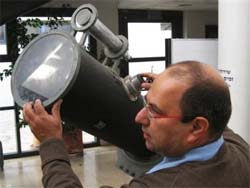Astronomers use "Einstein''s telescope" to determine makeup of universe
 Washington, Feb 21 : Scientists are using the phenomenon of gravitational lensing, which they call "Einstein''s telescope", as a scientific "instrument" in their quest to determine the makeup of the universe.
Washington, Feb 21 : Scientists are using the phenomenon of gravitational lensing, which they call "Einstein''s telescope", as a scientific "instrument" in their quest to determine the makeup of the universe.
The University of Chicago''s Evalyn Gates''s new book, "Einstein''s Telescope: The Hunt for Dark Matter and Dark Energy in the Universe", explains how it works.
Although based on Albert Einstein''s general theory of relativity, the effect is easily demonstrated.
According to Gates, look at a light through the bottom of a wine glass, and see the resulting light distortion.
"Einstein''s telescope is using the universe itself as a lens through which we can seek out galaxies that would otherwise be too faint to be seen," said Gates, Assistant Director of the University''s Kavli Institute for Cosmological Physics.
Long ago, Einstein recognized the potential existence of gravitational lensing, a consequence of his theory of general relativity.
According to general relativity, celestial objects create dimples in space-time that bend the light traveling from behind.
Einstein realized that the gravitational influence of a foreground star could theoretically bend the light of another star sitting almost directly far beyond it, producing two images of the background star.
"Gravitational lensing magnifies things as well as making multiple images and distorting the shape of images, so you can actually use it as a magnifying glass," Gates explained.
But, assuming that the effect would be too weak to detect, Einstein immediately dismissed its significance.
"What he didn''t anticipate, among other things, were the incredible leaps forward in telescope technology," said Gates.
Astronomers now use gravitational lensing to look for dark matter and the imprint of dark energy, two of the greatest modern scientific mysteries.
"We can''t see dark energy directly by any means, but we''re looking for how it has sculpted the matter distribution of the universe over the past few billion years, since it''s been the dominant factor, and also how it has affected the rate at which the Universe is expanding," Gates said.
Gravitational lensing is essentially the only method astronomers have for tracing out the web of dark matter that pervades the Universe, and determining how dark energy has impacted the evolution of this web.
"It''s really hot scientifically," she said.
"Gravitational lensing is going to allow us to image the universe in ways that wouldn''t have been possible even 50 years ago," said Gates.
"It may lead us to another revolution in our understanding of the most fundamental aspects of the universe, time, matter, and energy," she added. (ANI)